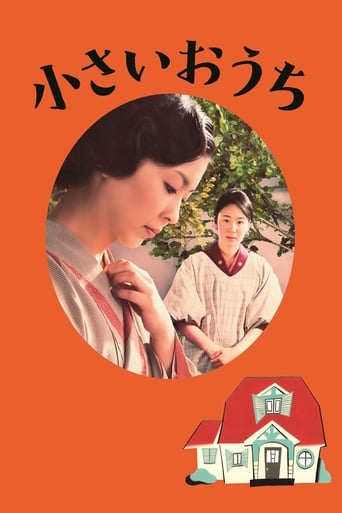


The Little House
Following the death of the unmarried and childless Taki, Takeshi, a young relative of hers, discovers several pages of closely written lines in which the old lady has recorded her memories. This is how he learns the truth about her youth working as a housemaid and nanny for the Hirai family in a little house in Tokyo with a red gabled roof.
-
- Cast:
- Takako Matsu , Satoshi Tsumabuki , Chieko Baisho , Yui Natsukawa , Yukijiro Hotaru , Isao Hashizume , Kazuko Yoshiyuki


Similar titles









Reviews
Very well executed
Just what I expected
How sad is this?
Worth seeing just to witness how winsome it is.
I had this movie earmarked for a long time, until I finally got a chance to see it today. I've seen few Yoji Yamada flicks before, to mention some of the best: "The Hidden Blade" (2004), "The Twilight Samurai" (2002) and "Love and Honour" (2006), so I had at least some idea what to expect. But this... - This movie is nothing sort of a masterpiece! In spite the fact that Yamada is one of Japan's most productive directors of all time, I still wasn't quite prepared. This movie is simply irresistibly at the same time heart breaking and heart warming, without forgetting this is pure eye candy on film. The film has only few sets outside the house, which is just appropriate, as after all, the movie is about the "little red house". However, what truly makes this film is the outstanding performance by Haru Kuroki. Watching her playing the maid is so heart warming that just watching her is enough to make grown men start crying. I mean really, she doesn't even need to deliver any lines! Mark my words, you will hear from this young actress in the future. I knew she had won the Silver Bear for best actress at the 2014 Berlin Film Festival, for her performance in this film, but I had no idea the role she played was this good! While watching her playing this modest, humble and loyal maid is something you will never forget. I can't even remember when I have seen a performance by an actress the last time, that would be even close to the sheer brilliance of this role. I think I will also need to have a look at some of the Yamada's older films, to see if there is anything I have missed.If you believe you could have an understanding and insight for Art House -films, but have never watched any before, this would work really well as an introduction to a larger world. What a simply wonderful movie!
I am reviewing this film just after re-watching it and then seeing Ozu's penultimate work An Autumn Afternoon. Unfair comparison perhaps, but Yamada's work is often considered an extension of the genre for which Japanese film masters have gained attention in world cinema. I rate it a 10 for effort beginning with Shochiku Studio still striving to finance this low key genre in the face of more box office-busting animation and glorified versions of TV shows. Yamada gets a 10 for attempting to film the award-winning novel that some have said is very difficult to present on screen. But I am rating it 5 based on film masterpieces.The set for the pre-WW2 comes across as totally artificial unless the art direction is to portray an idealized dream-like setting in maidservant Taki's imagination. As some critics remarked, the house and especially its kitchen looks unlived in. If the intent was an idealized setting, this might occur to the viewer after repeat viewings which very few people do. I have to see a film several times due to being initially distracted by subtitles. Being an architect I am a good judge of real building and the sheer technical inability of the house roof to keep out any storm water bugs me. Maybe it would have been OK had the red roof not figured so prominently in the script and the French title for the film. And what's with the film's depiction of the American bombing of Tokyo? It came across on the screen like a celebratory event instead of a tragedy. A big reason for my only average rating is the casting and the acting direction. Not enough age contrast between husband and lover. In the novel the husband is much older and this would have given more plausibility to the affair. The lover acted his part well enough, but Yamada alumnus Hidetaka Yoshioka is too old to portray the part. The acting direction of the modern portion is overwrought with forced emotion. Satoshi Tsumabuki is typically successful at conveying any emotion with the most subtle facial and body expression. Here he is forced to act in artificially enthusiastic way to make the relationship between grand aunt and grand nephew seem close. He came across as a rank amateur actor here. The script kept including references to "girlfriends" to counter Takeshi's seemingly artificial relationship with older Aunt Taki. The "biographer" would have been more plausible as female, but likely at the expense of the box office. I found the scripted ending overly dramatic for the secret it was to reveal. It did convey the idea of Japanese deference to privacy and propriety. But why did Takeshi's girlfriend have to pointedly ask permission to use the scissors? We westerners already find it odd that Japanese always use scissors to open envelopes. Too many tears were shed by Takeshi and Taki at the closing. Ozu just had his characters sit quietly with eyes downcast, but we got his message.
Those familiar with Yoji Yamada's work will know what to expect from this, his latest work that won for Kuroki Haru the Best Actress Award in this year's Berlin Film Festival. Rest assured that these expectation will be fully met. There is again a wealth of delicate emotions and overflowing warmth. And then there is more.Film lovers can easily call up in their mind a list of works that have a house as a motif, a theme, or even the main character (yes, but unfortunately I can't remember this one's name). This house here is in bright red, glimmering like an exquisite gem on a ridge overlooking an interesting landscape somewhere in Tokyo. The main body of the story takes place in this house in a period of about 7 to 8 years, from the prelude of WW II to dropping of the atomic bombs. Expectedly this is from Japan's perspective. The perspective however is not from makers and shakers of events, but rather from that of everyday common folks the depiction of which Master Akira Kurosawa excelled in. Yoji Yamada has shown that he is equally deft in this.While the main story took place more than half a century ago, the movie actually starts with the present, and effortlessly glides seamlessly between two time frames which are just a few months apart: before and after the death (from old age)of an independent woman living alone, Taki (Baishou Cheiko). From both of these time frames, the audience is transported back to the main story via VOs, from two people. From after Taki's death, it is her grandnephew Takeshi (Satoshi Tsumabuki) looking over the things she left behind. From before her death, it is the two of them discussing her story in his effort to help her write her autobiography.The main story starts with young Taki (Kuroki Haru) leaving her home in desolate and poverty stricken northern Japan to seek a better life in Tokyo. In the titular house, as a servant girl, she is received with kindness by the young mother Tokiko (Takako Matsu) who treats her like a sister. Her main job is to look after 7-year-old (or thereabout) young master who soon get infected with polio. Through Taki's dedicated service that includes carrying the kid in a long walk to the masseur-healer daily and eventually learning to apply the message herself, he gradually recovers. This cements her relationship with the family.Let me turn to the macro scene for a moment. The head of the family (Tokiko's husband) is a typical businessman, something like a second-in-charge in a toy manufacturing firm. Entertaining colleagues (including the boss) in his house is not unusual. Yoji Yamada utilizes these occasions to paint a broad brush picture of the perspective of everyday businessmen during the period of Japanese aggression in WW II: they look at it as business opportunities, first and foremost. It isn't until towards the end of the movie that, through the words of the little boy who is now an old man on a wheelchair (the polio was healed, but never totally), that Yoji Yamada delivers the message of those who look back and finally see what atrocity they have been deceived by the militant government into condoning.Back to the intimate story, the real intrigue begins with a new colleague in the toy company appearing on the scene, a gentle soul of a young designer called Itakura (Hidetaka Yoshioka). As an affair develops between Itakura and Tokiko, it would seem at a quick glance that Taki makes up the third of a triangle. It is, and it isn't. Taki is not in love with Itakura, but jealous of him. While I confess readily to the guilt of putting this so bluntly, Yoji Yamada's handling of this is all gentle subtlety. We don't even need to affix a label. Call this an affection and warmth one woman feel for another that dances tantalizingly between admiration, romance and desire. Here, there is also loyalty.I cannot even begin to describe the layers and layers of subtle emotions that are bottled up in Taki. Maybe that is why young Kuroki Haru (born 1990) won the Berlin award while many thought it should have gone to Takako Matsu. And here is a Takako Matsu that you have never seen before, depicting such a wide range of emotions including amorous and bitchy (slightly so, I have to qualify). Not to be forgotten, however, is the third woman Baishou Cheiko who plays aged Taki so pitch-perfectly that she deserves to win the award just as much as the other two. Watch this movie. Take your pick.
Taki (Haru Kuroki) comes from northern Japan to Tokyo to join the Hirai household as a housekeeper. Back in the pre-war days the newly rich upper-middle classes built their own houses out in the suburbs, adopting Western style furnishings and fashions. And the Hirais built a very nice little house with a red roof. Taki quickly fits in and bonds quickly – too quickly – with Tokiko, the young wife and mother (Takako Matsu). She loves it so much there that she turns down an opportunity to marry into wealth. Husband (Takataro Kataoka) spends a lot of time at the office and traveling around for his toy company, which leaves plenty of time for Tokiko to pursue her own pleasures, like any decent housewife at that time. But it all changes when Itakura (Hidetaka Yoshioka), a young employee at husband's company, comes to visit. Tokiko is immediately attracted to him – he's handsome, cultured, artistic and a bit sickly – hitting all the right buttons for Tokiko. The feeling turns mutual as circumstances bring them together again and again. To Taki's dismay they begin an affair. This is where the film compares to Remains of the Day. Though the division between master and servant isn't as distinct in Japan, the housekeeper is still an employee, and the employee has to keep her own feelings to herself. Taki struggles with this as Tokiko becomes consumed and careless. Kuroki won the Silver Bear at the Berlin Film Festival for her performance, which was a surprise to many. But Kuroki beautifully portrayed Taki's struggle as the perfect world began to crumble. It is a too common Japanese theme: put on a brave front and never show your struggles. But in this film it's nicely presented.
